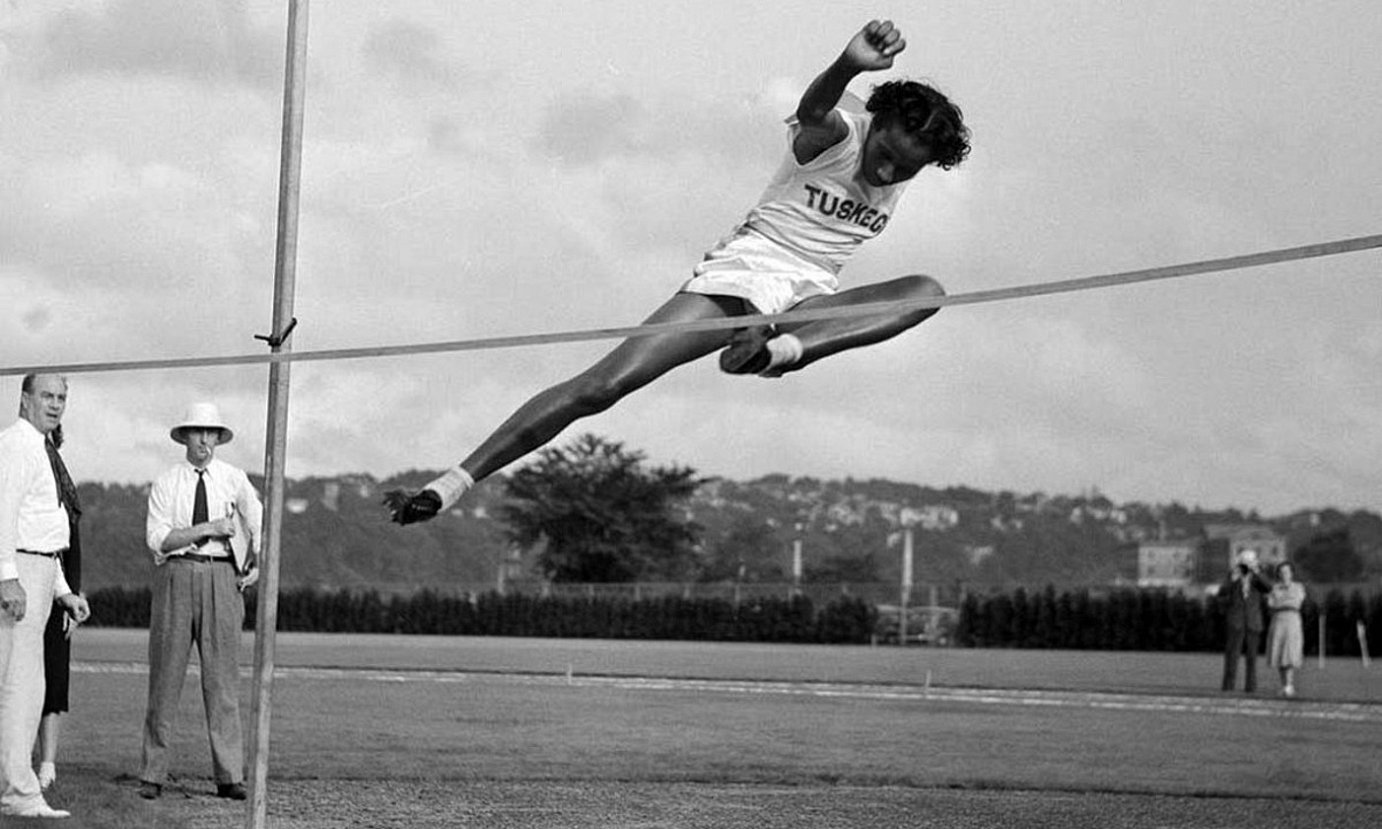1. Overview
Alice Marie Coachman Davis (November 9, 1923 - July 14, 2014) was a pioneering American track and field athlete. Specializing in the high jump, she achieved historic significance by becoming the first Black woman to win an Olympic gold medal, a feat she accomplished at the 1948 Summer Olympics in London. Her athletic career, marked by dominance in national competitions and a groundbreaking Olympic victory, paved the way for future generations of African American athletes.
2. Early life and education
Alice Coachman's formative years were shaped by the challenges of racial segregation and limited opportunities for women in sports in the American South. Despite these barriers, she displayed remarkable athletic talent from a young age, which eventually led her to pursue higher education and formal training.
2.1. Early life and home environment
Alice Coachman was born on November 9, 1923, in Albany, Georgia, as the fifth of ten children to Fred and Evelyn Coachman. Growing up in the racially segregated South, she faced significant obstacles that prevented her from accessing formal athletic training facilities or participating in organized sports due to her skin color. Additionally, her status as a female athlete was met with widespread societal opposition to women in sports during that era. Undeterred, Coachman improvised her training, running shoeless along the dirt roads near her home and using makeshift equipment to practice her high jumping technique. Her passion for sports was encouraged by her fifth-grade teacher, Cora Bailey, and her aunt, Carrie Spry, even though her parents had reservations about her athletic pursuits.
2.2. Education
Coachman attended Monroe Street Elementary School in Albany. In 1938, she enrolled at Madison High School, where she joined the track team. There, she worked closely with coach Harry E. Lash, who helped her develop her athletic skills. Her talent quickly garnered attention, leading to an offer of a scholarship from the Tuskegee Institute in Tuskegee, Alabama. In 1939, at the age of 16, she joined the Tuskegee Preparatory School. The scholarship, however, came with the requirement that she work while studying and training, which included duties such as cleaning and maintaining sports facilities and mending uniforms. She graduated from the Tuskegee Institute in 1946 with a degree in dressmaking. The following year, she continued her academic journey at Albany State College (now Albany State University), where she earned a Bachelor of Science degree in Home Economics with a minor in science in 1949. After completing her education, Coachman embarked on a career as a teacher and track-and-field instructor.
3. Athletic career
Alice Coachman's athletic career was characterized by her exceptional talent and unwavering dedication, allowing her to achieve unparalleled success despite the systemic barriers she faced. Her unique jumping style and consistent performance made her a dominant force in track and field for over a decade.
3.1. Early career and AAU competitions
Even before her arrival at the Tuskegee Preparatory School, Coachman had already begun to make a name for herself in the Amateur Athletic Union's (AAU) Women's National Championships. Competing barefoot, she broke both college and national high jump records. Her distinctive jumping style was a blend of a straight jumping approach and the Western roll technique. From 1939 to 1948, Coachman dominated the AAU outdoor high jump championship, securing ten consecutive national titles.
3.2. Olympic participation and gold medal
The Second World War led to the cancellation of the 1940 and 1944 Olympic Games, preventing Coachman from competing during what was considered her athletic prime. Sportswriter Eric Williams suggested that had she been able to compete in those canceled Olympics, she might have been regarded as the greatest female athlete of all time.
Coachman's first and only opportunity to compete on a global stage came at the 1948 Summer Olympics in London. She qualified for the US Olympic team with a high jump of 5 in, surpassing the standing 16-year-old record by NaN Q in. In the high jump finals, Coachman cleared 5.5 ft (1.68 m) on her very first attempt. Her closest competitor, Dorothy Tyler of Great Britain, also achieved the same height but only on her second try, securing Coachman the gold medal. This victory made Alice Coachman the only American woman to win an Olympic gold medal in athletics at the 1948 Games, and, more significantly, she became the first Black woman in history to win an Olympic gold medal. Her medal was personally presented by King George VI.

3.3. Achievements in other events
Beyond her remarkable success in the high jump, Coachman also excelled in other track and field disciplines. She won national championships in the 50-meter dash and the 100-meter dash. As a student representing the Tuskegee Institute, she was also part of the 400-meter relay team that won national championships in 1941 and 1942. Demonstrating her versatility, Coachman also played as a guard on the Tuskegee women's basketball team, helping them secure three conference championships during the same period.
4. Post-Olympic activities and recognition
Following her historic Olympic triumph, Alice Coachman returned to the United States as a celebrated figure. Her achievements garnered significant public attention and led to various forms of recognition and endorsements.
Upon her return, Coachman was honored with parades stretching from Atlanta to her hometown of Albany, Georgia. She met with President Harry S. Truman and former First Lady Eleanor Roosevelt, and a party was held in her honor by the renowned bandleader Count Basie. In 1952, she made history again by becoming the first African-American woman to endorse an international product, signing on as a spokesperson for the Coca-Cola Company. She was prominently featured on billboards alongside the legendary 1936 Olympic winner Jesse Owens. In her hometown of Albany, both Alice Avenue and Coachman Elementary School were named in her honor, commemorating her groundbreaking achievements.
5. Later life and death
Alice Coachman's competitive athletic career concluded at the age of 24, but her dedication to community and education continued throughout her life.
5.1. Later activities
After retiring from competitive sports, Coachman devoted the remainder of her life to education and to the Job Corps, a program that helps young people improve their lives through vocational training and education. Her work in these fields reflected her commitment to fostering opportunities for others, much like she had created for herself.
5.2. Death
Alice Coachman passed away on July 14, 2014, in Albany, Georgia. Her death was attributed to cardiac arrest, following a period of respiratory problems. A few months prior to her passing, she had suffered a stroke, for which she received treatment at a nursing home. Coachman had two children from her first marriage to N. F. Davis, which ended in divorce. Her second husband, Frank Davis, preceded her in death.
6. Legacy and evaluation
Alice Coachman's impact extended far beyond her athletic achievements, solidifying her place as a trailblazer who broke down racial and gender barriers in sports and inspired countless individuals.
6.1. Honors and awards
Coachman received numerous honors and awards throughout her life and posthumously, recognizing her significant contributions to sports and society. In 1975, she was inducted into the USA Track & Field Hall of Fame. Four years later, in 1979, she was also inducted into the Georgia Sports Hall of Fame. During the 1996 Summer Olympics in Atlanta, she was celebrated as one of the 100 greatest Olympians. In 1998, she became an honorary member of the Alpha Kappa Alpha sorority. The National Women's History Project designated her as a Women's History Month Honoree in 2002. Finally, in 2004, she was inducted into the United States Olympic & Paralympic Hall of Fame.

6.2. Social impact and evaluation
Alice Coachman is widely recognized for opening doors for future generations of African-American track stars. Her pioneering achievement at the 1948 Olympics served as a powerful inspiration for athletes such as Evelyn Ashford, Florence Griffith Joyner, and Jackie Joyner-Kersee. Indeed, in the decades following her Olympic success, Black women have constituted a majority of the US women's Olympic track and field team. Reflecting on her legacy, Coachman once stated, "I think I opened the gate for all of them. Whether they think that or not, they should be grateful to someone in the black race who was able to do these things." Her life and career stand as a testament to her resilience in overcoming racial segregation and gender discrimination, making her a pivotal figure in the history of sports and civil rights.